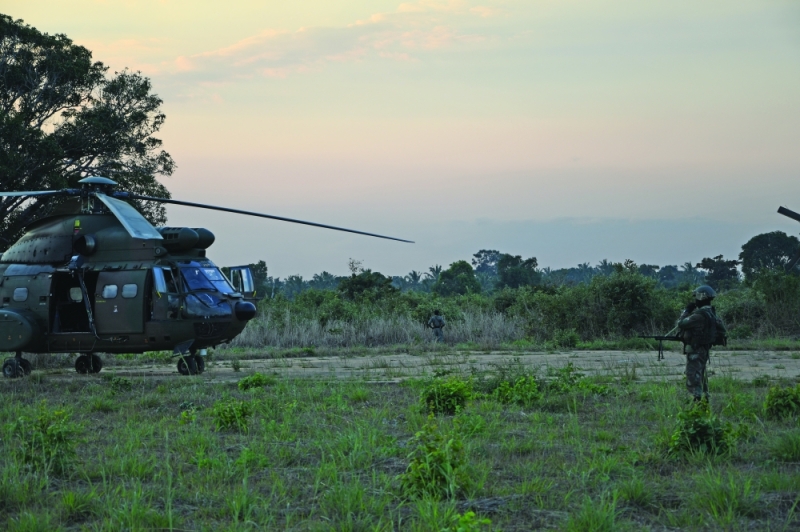Christmas in combat: SADC marks 6mths in Moz
Mbongeni Mguni | Monday December 27, 2021 06:00


Botswana is part of several SADC states which deployed troops to quell the terrorist insurgency in Mozambique in July. Known as the SADC Mission in Mozambique (SAMIM), the regional troops had their original six-month deployment extended to March next year after assessments by the regional leadership and Mozambique.
Botswana is deputising South Africa in SAMIM, while Secretary for Political Affairs in the Presidential Affairs ministry, Professor Mpho Molomo, has been seconded to Mozambique as head of the SADC Mission.
The terrorist conflict in Mozambique’s northern Cabo Delgado province, an oil rich region, has seen more than 3,000 people killed since 2017, with reports of beheadings, disembowelling of expectant mothers and other atrocities by the insurgents reported.
The recent attack was the deadliest of the deployment with SADC forces killing 14 terrorists on December 19 and 20, while also suffering one death and two injuries. While SAMIM’s statement on Thursday did not specify the nationality of the casualty, South Africa’s Department of Defence confirmed that the late soldier was a member of the South African National Defence Force (SANDF). The nationality of the two injured soldiers has not been disclosed yet.
The Mozambican national army suffered six casualties in the attack, two of them being deaths.
“During this operation, eight women, three children and two elderly males believed to have been abducted by the terrorists were rescued,” reads the statement issued by SAMIM spokesperson, Major Patrick Mfaladi. “The victims are under the care of national authorities. The number of terrorists killed from the start of the offensive to date stands at 23.”
From available records, it appears the recent casualties are the heaviest the SADC forces and their Mozambican counterparts suffered in a single campaign. The death of the SANDF member has drawn criticism of SADC’s campaign in Mozambique from the South African National Defence Union (SANDU) and the opposition Democratic Alliance.
“SADC must either accept and properly prepare and support troops deployed or get our soldiers out of war zones,” Democratic Alliance’s shadow defence and military veterans minister, Kobus Marais was quoted as saying by South African media this week.
Defence analysts in South Africa are also questioning how the insurgents were able to gather enough intelligence to launch an attack on the SADC troops. Initial reports from the area suggest the troops were returning from the campaign when they were ambushed prior to departure.
“The members managed to fight through the ambush. However, while at the rendezvous awaiting the chopper, they got attacked by the insurgents again,” reads an SANDF statement released this week.
Independent terrorism expert, Jasmine Opperman told Cape Talk radio on Tuesday that it was unlikely the troops deployed to Mozambique would return home within 24 months.
“This is an endless deployment and we are not near the end. With counter insurgency you can only defeat the enemy by breaking the momentum, but the problem is that the Mozambique government is obsessed with a winning narrative. The rebels are coming back to execute more and more sophisticated attacks and expanding the battle field,” Opperman said.
She added that the region was facing a threat that could become an “institutionalised presence” should the insurgency not be tackled properly.
“It’s not about winning the war. It’s about sustaining stability for the people of Cabo Delgado,” she told Cape Talk radio.
The recent attack has raised concern that SADC troops, who spent most of the year pushing back the insurgents and gaining ground, may go into the new year more deflated.
Defence, Justice and Security minister, Kagiso Mmusi flew to Mozambique earlier this week for an update on the mission, with state-owned newspaper, Daily News reporting that the visit was to boost morale and convey a message of gratitude.
The newspaper quoted Mmusi as saying SADC was determined to contribute in neutralising the threat posed by insurgents and to restore security in order to create an environment for the return of law and order.
For his part, Mfaladi said SADC forces were resolute in their mission.
“SAMIM Forces continue to dominate and pursue the insurgents in the operational area. SAMIM forces in support of the Government of Mozambique continue to create conditions necessary for a return to normal life in the Province of Cabo Delgado as it pursues the terrorists. SAMIM would like to assure the people of Mozambique and SADC of a collective commitment to achieving a peaceful, stable and secure Cabo Delgado as well as the entire country of Mozambique,” he said.
The troops will also take heart from statements made by Mozambican president, Filipe Nyusi in his recent State of the Nation Address to his citizens.
“The joint operations of the Mozambican, SADC and Rwandan armed forces have registered remarkable progress with immediate impact in neutralising the combative capacity of the terrorists,” Nyusi said.
He added that the number of insurgent attacks had dropped substantially, with 200 insurgents killed so far by all the forces active in Mozambique, including ten of their top leaders. Nyusi said while the terrorists had retreated into a new area, security forces were aware of the movements.
Meanwhile, SADC security leaders are due to meet before March to assess the situation and decide whether to further extend the troops deployment. Until then, the BDF and its regional partners will keep pressing against the insurgents in Mozambique’s north.
